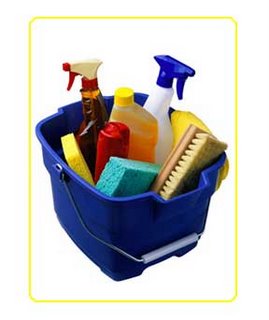
A good first step is to buy non-toxic cleaning products that won't leave a toxic residue, either on counter surfaces or in the air.
Alternatively, you can make your own cleaners. It's easy, and the ingredients are inexpensive and totally safe. If you want, you can add essential oils to any of the following cleaners, either to scent or, in the case of oils such as tea tree, sweet orange and lemon grass, to also disinfect. However, be careful to use only a few drops, as these oils are highly concentrated. Also, be sure to include an emulsifier such as witch hazel, aloe vera gel, cornstarch or vinegar, to make sure the oil blends with the other ingredients.
And for all your cleaning, try using microfibre cloths, which are reusable and designed to pick up dirt without any chemical cleaners. Or recycle old towels by cutting them into small squares or turn old dish cloths into cleaning rags.
All-purpose cleaners
Mix one part water to one part vinegar in a spray bottle for a cleaner that will also disinfect and deodorize kitchen surfaces.
Use borax, a naturally occurring mineral that deodorizes, disinfects, kills fungus and mould, boosts laundry soap and removes stains. It can be used as a multipurpose cleaner and an alternative to bleach. However, it is poisonous if ingested, so keep it out of the reach of children and don't use if near food.
1 tsp borax
1/2 tsp. baking soda
2 tbsp. vinegar
1/2 tsp. vegetable-oil based liquid soap (available in most health-food stores and in supermarkets with an organic/natural product section) or mild, fragrance-free, liquid hand soap
2 cups very hot water
*Lemon contains citric acid, making it an excellent and versatile cleaner that bleaches, disinfects, deodorizes, cuts trough grease and polishes brass and copper. Use half a lemon as a scrubber, adding baking soda for extra scouring power, to get glistering stainless-steel sinks and aluminum pots.
*Baking soda can be mixed with lemon or vinegar to make all-purpose cleaning solutions. Or make a paste with water and use it to polish siver.
Floors
White vinegar is an all-purpose cleaner, deodorizer and mild disinfectant that can be used to wash floors, clean windows and remove stains. Pour one part water to one part vineger in a spray bottle to clean, disinfect and deodorize surfaces or in a bucket to wash floors. Or make the following:
1/4 cup baking soda
1 tbsp mild vegetable-oil based liquid soap or mild, fragrance-free, liquid hand soap
1/4 cup vinegar
7 quarts hot water
Wood furniture
Three parts olive oil to one part white vinegar, or one part lemon juice
to two parts olive oil, make an excellent cleaner and polisher for wood furniture.
Pour the mixture into a spray bottle or dampen a soft cloth with it and rub clean.
Remove fingerprints or stainless steel surfaces and cooking utensils with a few
drops of olive oil on a soft cloth.
Windows
One part water to one part lemon in a spray bottle can be used to clean windows.
Drains
Regularly pour 1/2 cup baking soda down the drain, then 1/2 cup white vinegar. Let
stand for five minutes, and then pour in a full kettle of boiling water.
Stains
Salt mixed with baking soda or lemon juice, is good for cleaning tea and coffee
stains in cups and for removing red-wine stains from tablecloths.
Air-freshener
Put some orange peel, a few cinnamon sticks and some cloves in a piece of cheesecloth, tie it together and drop it in a pot of water. Simmer slowly for a
few hours, adding water as needed. Or simmer slices of lemon for a lemon-fresh scented home.
Tip
For lists of cleaning products that are healthier for you and the environment, and additional less-toxic cleaning tips and make-your-own recipes, check out The Guide to Less Toxic Products (www.lesstoxicguide.ca)
No comments:
Post a Comment